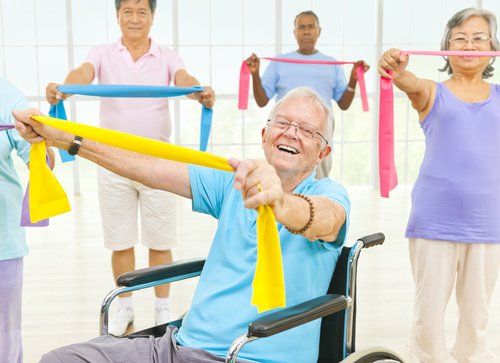A professional career as a clinical kinesiologist starts with choosing the right education and training program.
Please review the information provided below, including the areas of professional practice for kinesiologists.
It is important to recognize that not all kinesiology degree programs provide the education, skills or competency upon graduation to become a professional kinesiologist in an allied healthcare setting.
Choosing the Right Post Secondary Degree Program
If you are considering a career in professional kinesiology the BCAK strongly recommends that you carefully assess your career aspirations when choosing a post secondary degree program(s) suited to career path.
To become better informed on which degree program(s) will provide the necessary training, and competency to enter professional practice, we recommend you research the degree programs, learning outcomes and options available to you, including contacting program advisors for additional information.
Kinesiologists in BC can work in various practice setting, with most jobs requiring clinical practice knowledge and skills. Kinesiologists are recognized by BC's Ministry of Health as Allied Health Professionals. Kinesiologists entering practice in this capacity must have the entry level competencies necessary for safely and effectively provide the client care services expected of allied health professionals.
The BCAK admission standards for professional (Practicing and Non-practicing) membership are designed to meet this purpose. To become a BCAK member you will need to have completed courses designed to provide you with the knowledge and skills (learning outcomes) appropriate to work in a clinical environment, including a strong understanding of evidence-based practice, jurisprudence and professional ethics, including the laws related to the provision of healthcare services to the people of BC.
Post Secondary Institutions (PSIs) may offer a variety of bachelor's and master's level degree programs designed to provide students with different skills and competencies. Examples of the different degree streams, includes:
- Academic degree streams - commonly designed to provide students with a strong theoretical knowledge based focused on current research and research methods with the goal of producing the next generation of academic researchers and educators, with students completing additional research based M.Sc. and/or Ph.D. degrees after completion of their undergraduate degree, leading to a career in academia and/or research.
- Physical Fitness/Athletic Training/Strength and Conditioning degree streams -commonly designed to prepare students to provide health promotion services for the physical fitness and/or high level athletic performance.
- Interdisciplinary degree streams - commonly designed to allow students to learn across multiple disciplines to enhance a student's future educational opportunities by helping them to identify, choose and prepare to enter a professional training or graduate level program in a chosen field.
- Clinical Professional practice degree streams - provide students with coursework focused on applied entry-to-practice knowledge and skills. The programs incorporate work integrated learning (WIL) placements in public and private healthcare facilities to prepare them to competently enter the work force and serve a variety of clientele, including clinical populations, such as those with hereditary and lifestyle diseases, orthopaedic injuries, older adults, mental health disorders, traumatic brain injuries, including disability management and ergonomic assessment skills.
Over the past 30 years, the profession of kinesiology has evolved beyond athletic performance coaching and personal training, but has not left these skills behind. In addition professional kinesiologists require applied knowledge in disease pathophysiology behaviour change counselling, clinical exercise testing and prescription, orthopaedic injury assessment and treatment, chronic pain and trauma informed care, infection prevention and control, return to work and activities of daily living planning.
A post-secondary institution degree program that delivers hands-on, entry to practice knowledge and skills can be identified through the education and training courses it provides, such as:
- Clinical client intake, history taking and risk screening
- Disease pathology/pathophysiology
- Clinical exercise physiology
- Assessment, testing and exercise prescription for clinical populations including:
- Endocrine/metabolic disorders - including osteoporosis,
- Pulmonary disease - asthma, cystic fibrosis, COPD,
- Cardiovascular disease & cardiac conduction disorders,
- Neurological disease,
- Oncology,
- Osteo and rheumatoid Arthritis,
- MS, osteoporosis and others such as connective tissue disorders.
- Functional movement and task analysis
- Orthopaedic (musculoskeletal) injuries, postural anomalies and movement disorders
- Traumatic Brain Injury (TBI) and Concussion Management
- Behaviour modification in exercise and lifestyle counselling, including cognitive behavioural therapy and motivational interviewing.
- Practice knowledge on the safe prescription and delivery of exercise for those with mental health disorders, Alzheimer's, dementia and other diseases of aging.
- Healthy living, disease preventative and corporate wellness program design/implementation
- Active rehabilitation, return to work planning and implementation
- Ergonomics, including physical demands description and analysis, office and industrial workstation (re)design, work hardening programs
- Disability Management
- Assistive/Adaptive Devices (including taping and bracing)
- Healthcare provider jurisprudence, ethics and professional regulation
- Professional practice and interdisciplinary care
- Healthcare record keeping (charting, report writing and interpretation)
- Infection Prevention and Control
- Trauma Informed Care
- Work Integrated Learning opportunities in healthcare settings
Details of the essential knowledge and skills required to be a BCAK Practicing kinesiologist can be found in the BCAK's Essential Competencies of Practice




